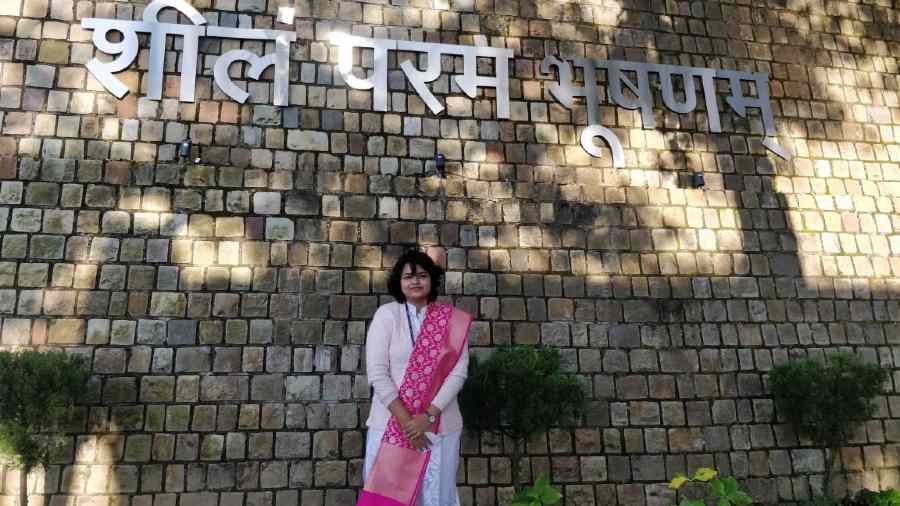Of the seven successful candidates who cracked the Civil Services from West Bengal in 2020, Mayuri Mukherjee is the only woman. Her all-India rank was 159 and she opted for Indian Revenue Services — Income Tax (IRS-IT).
She says, “I am happy to join IRS-IT. Income tax is a key service that contributes to the development of our nation. Now I shall be a part of the nation-building project.” However, with her rank, she could have easily joined the Indian Police Services (IPS), but she decided to give it a miss because she dreads “the rigorous physical training one has to undergo for it”. She adds, “Games, sports or fitness have never been my cup of tea. I had never won any prize in my school sports except for musical chairs.”
Born and brought up in Birati, on the northern fringes of Calcutta, Mayuri had joined the Indian Institute of Chemical Biology (IICB) for her PhD. Inspired by her father, a retired schoolteacher, she always wanted to be in academics. “Everything was more or less streamlined — BSc-Msc-PhD and, finally, a career as a professor,” she says.
But while working as a researcher in bioinformatics at the IICB, she found that the best option for her was to go abroad for postdoctoral research. “The tenure of my research fellowship (CSIR-NET) was just five years. After that I would have had to either go for postdoc or take the college service commission exams. So, I started looking for career options outside teaching or academics.”
And that is when she came across the civil services option. Her first attempt was in 2018. She also tried cracking the West Bengal civil service. “I failed in the preliminary exams twice because I couldn’t devote more than a couple of hours alongside my lab work. I had to spend eight to nine hours daily in the lab,” she says.
Mayuri’s parents and her research supervisor at the IICB constantly encouraged her to go for the administrative service. After 2019, she focussed on the Union Public Service Commission (UPSC) exams with a new vigour. Unlike most other aspirants, she had decided to study from Calcutta, not Delhi. She says, “When I did my MSc (Botany) from Delhi University, I stayed close to the hub of the civil services coaching institutes there, but I had no interest in it at that time.”
In Calcutta, she joined the Satyendranath Tagore Civil Service Study Centre in Salt Lake. She says, “I attended classes only on weekends as I had to do my lab research on weekdays.” That was in 2019.
In 2020, Mayuri’s lab was completely shut for two months because of the pandemic. Later, research work resumed but she didn’t have to visit the lab daily. She says, “This gave me ample time to study for the civil services. The lockdown was a boon — it helped me concentrate on self-study.”
She continued writing her thesis as well as preparing for the prelims in October 2020. Then she took a month’s leave before the mains in January 2021. She says, “I submitted my PhD thesis in August this year and appeared for the UPSC interview in September.”
Mayuri doesn’t have any qualms in admitting that she had a little trouble adjusting, given that she had studied in Bengali-medium schools all along. She had faced this problem in college — Presidency College — too. She says that it’s possible to crack the civil services exams in Bengali, but very little study material is available in the language. Fluency in English might be a problem, but that doesn’t matter much in interviews — the interview board doesn’t consider fluency in English an essential skill because they know that most candidates do not get the opportunity to study in English medium schools.
Her advice to civil service aspirants is that they should mentally prepare themselves for a big battle. First, the exams — prelims, mains and interview — continue for over a year. “You need at least two years’ preparation to crack these. Candidates appearing for the examinations must not give up hope if they can’t crack it on first attempt.”
Mayuri has broken another myth — that you can’t crack the civil services if you don’t stay in Delhi. According to her, there’s plenty of study material available on the Internet for free. These days a lot of study material, video lectures and mock tests are available online. You have to use the right keywords to track them down. But don’t get lost in the maze of the Internet and lose precious time.
Her tip for aspirants, “It’s a long haul. It’s only natural that you’ll often lose hope and come in the grips of despair. But, keep your confidence alive and keep a back-up career or a fall-back option in mind.”










